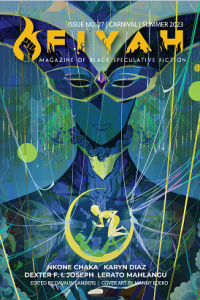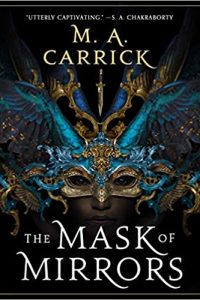Faren Miller reviews Beth Cato
The magic that saves lives in The Clockwork Dagger, a memorable debut by Beth Cato, centers around the myth of another mortal woman who lost loved ones to illness and became a lady goddess. That myth, and its healing Tree, arose somewhere near the dawn of culture in Caskentia – a realm where ‘‘clockwork’’ and other weird sciences now prevail, creating something like a fantastical/steampunk Oz not meant for innocent young readers.
Octavia Leander had been an orphaned street urchin when Miss Leander took the girl into her academy, devoted to the training of ‘‘medicians.’’ As the book begins, she has already proven herself (and seen horrors) tending the wounded on the front of an ongoing war between Queen Evandia’s downtrodden conscripts and rebels from a blighted region – in their parlance the Dallows, otherwise the Waste. The situation appears particularly dire when compared to the state of things in Tamara, ‘‘that nation of science and logic far to the south,’’ ancestral home of the steward whom Octavia meets on the airship (powered by ‘‘enchanted aether’’) taking her to her next assignment.
He displays his heritage with ‘‘skin the color of nutmeg’’ and a formidable competence, but the dashing fellow – known through most of the tale simply as Mr. Garret – is a born-and-bred Caskentian. He lost part of one leg in the fighting and uses a mechanical extension; Octavia immediately senses its presence under his clothing, thanks to her remarkably keen ability to hear and comprehend the ‘‘music’’ of existence, where health produces harmony, wounds and ailments discord. For her as for few others, each substance and every mental state has its own sound. Hearing them all together can be cacophony.
Octavia’s no ordinary medician, Garret’s no simple steward, and yet neither one regards their talents as an excuse for grandiose behavior. Their mutual attraction develops into a romance depicted with the sly discretion of Jane Austen, while roaring sensuality lurks just beneath the surface. For all of its amusingly antique expressions (things like a muttered ‘‘Fiddlesticks’’) and highly developed forms of magic, The Clockwork Dagger shares its heroine’s vivid awareness of the physical world.
Adventure fiction, from the early days of pulp, adds a further element, as the reading matter of Octavia’s roommate on the airship, the aptly named Mrs. Stout – a publisher’s widow who plays a greater role than one might suspect in a novel filled with its own perils, escapes, and revelations. Beth Cato handles this heady mix with a fine sense of language, emotion, and event, making the whole thing flow more like a force of nature than the work of a first novelist.








